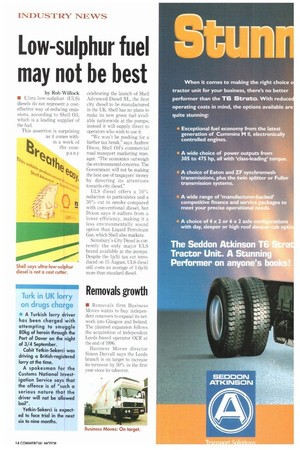Low-sulphur fuel may not be best
Page 16

If you've noticed an error in this article please click here to report it so we can fix it.
by Rob Willock • Ultra-low-sulphur (ULS) diesels do not represent a costeffective way of reducing emissions, according to Shell Oil, which is a leading supplier of the fuel.
This assertion is surprising as it comes within a week of the company
celebrating the launch of Shell Advanced Diesel XL, the first city diesel to he manufactured in the UK. Shell has no plans to make its new green fuel available nationwide at the pumps; instead it will supply direct to operators who wish to use it.
"We won't be pushing for a further tax break," says Andrew Dixon, Shell Oil's commercial road transport marketing manager. "The economics outweigh the environmental concerns. The Government will not be making the best use of taxpayers' money by directing its attentions towards city diesel."
ULS diesel offers a 10% reduction in particulates and a 30% cut in smoke compared with conventional diesel, but Dixon says it suffers from a lower efficiency, making it a less environmentally sound option than Liquid Petroleum Gas, which Shell also markets.
Sainsbury's City Diesel is currently the only major ULS brand available at the pumps. Despite the lp/lit tax cut introduced on 15 August, ULS diesel still costs an average of 1.6p/lit more than standard diesel.
















































































































